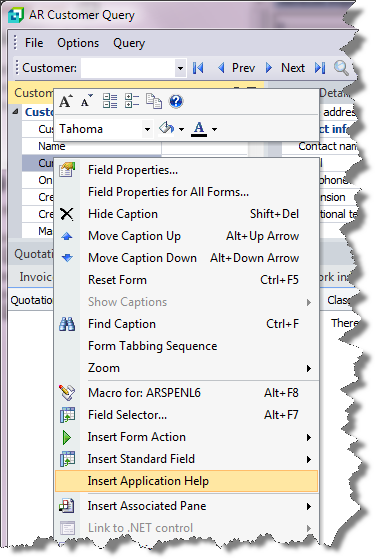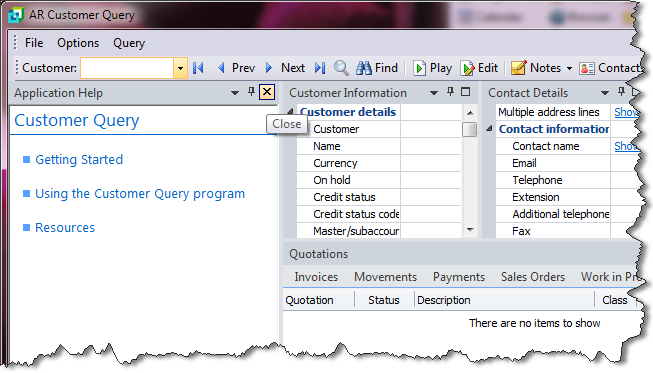You use this program to create a master and sub-account relationship between customers, typically for statement printing purposes.
- Toolbar and menu
- AR Master Sub-account Maintenance
- Customer Details
- Master/Sub Cross Reference
- Notes and warnings
| Field | Description |
|---|---|
| Customer | Enter the master customer to which you want to attach sub-account customers (or detach sub-account customers). |
This editable list view enables you to enter and maintain the details of the sub-accounts attached to the master account entered in the Customer field on the toolbar.
These listview details can be printed and exported if you want to keep a log of accounts attached or detached.
| Field | Description | ||||
|---|---|---|---|---|---|
| New | Enables you to add a new line to the listview to enter the sub-account details. | ||||
| Delete | Detaches the sub-account from the master account. See Notes and warnings. | ||||
| Save | Saves any changes made in the listview. | ||||
| Sub-account number |
Indicates the customer code that must be linked to this master account as a sub-account. |
||||
| Name | This indicates the name of the sub-account customer you entered. | ||||
| Store no |
This is used as the default reference during AR Invoice Posting, and the default customer purchase order number during Sales Order Entry (but can changed when capturing an order). For example:
An order is received from Bikes and Blades – South, with a purchase order number of MS 456. When the sales order is processed, the store number of South is automatically entered as the customer purchase order number by the Sales Order Entry program. The actual purchase order number provided by Bikes and Blades – South (i.e. MS 456) can be appended to this, enabling both references to be printed on the Master account statement (e.g. South MS 456). If invoices are attached to the master account, then this allows the master account to identify which of its branches incurred the debt (providing the store number is printed on the statements and sales order documents). |
||||
| Invoices attached to | This indicate where the invoices for the sub-account must be posted to. | ||||
| Master account | The sub-account customer's invoices and balances are
accumulated into the master account. Month-to-date sales are
posted against the sub-account, while finance charges, terms
and credit checking are performed against the master
account. You can define whether the sold to address of the master account or the sub account must be printed on sales order documents.
|
||||
| Sub-account | The sub-account customer's invoices and balances are
retained against the individual attached account. When printing statements you can select to print a consolidated statement where the invoices for the sub-account customer are consolidated and printed on the master account customer's statement. Alternatively you can print a statement for the sub-account only. |
||||
| Use bill to address from | If invoices are attached to the master account, then you can additionally specify which sold to address must be printed on the sub-account invoice, delivery note and order acknowledgement. | ||||
| Master account | Prints the master account sold to address on invoices, delivery notes and order acknowledgement documents for the sub-account. | ||||
| Sub-account | Prints the sub-account sold to address on invoices, delivery notes and order acknowledgement documents for the sub-account. | ||||
This displays details of the master account customer entered in the Customer field on the toolbar.
This displays details of invoices currently attached to the master and sub account invoices according to your selection at the Invoices attached to option.
This information is refreshed each time you attach or detach a sub-account.
- A sub-account customer cannot have any accounts attached to it (i.e. it cannot be a master account itself) and cannot be attached to more than one master account customer.
- The currency code held against the master and sub-account customers must be the same.
- The entry defined against the Balance print type field for both the master and sub-account customers must be the same (AR Customer Maintenance).
-
If you detach a sub-account customer (where invoices and balances are held against the master account) the invoices and balances for the sub-account remain on the master account and are not transferred to the sub-account. This also applies to invoices raised using the AR Finance Charge Calculation program.
If you want to have the sub-account invoices shown on the sub-account after the detachment, we recommend that you transfer them from the master to the sub-account using the Adjustments function in the Payments and Adjustments program.
-
Although you can detach a sub-account customer with outstanding sales orders from a master account customer, you will be unable to delete the sub-account if there are any outstanding sales orders attached.
Inserting Application Help
You would typically follow this procedure to display help for the current program in a customized pane that can be pinned to the program window.
Information includes step-by-step instructions for the various functions available within the program, including a brief overview of what the program does, what setup options are required and how to personalize the program.
-
Open the program for which you want to insert application help into a customized pane.
This functionality is only available for a program that has panes.
-
Right-click any form field.
You can also click the triangle menu icon that appears in the title area of a pane.
-
Select Insert Application Help from the context-sensitive menu.
The application help appears in a pane within your program. You can reposition the pane using the docking stickers or pin it to the program window.
Removing the Application Help pane
If you no longer want to display application help in a pane for your current program, you can simply remove it.
-
Select the Close icon in the right-hand corner of the application help pane.
-
Confirm that you want to delete the pane.
![[Note]](images/note.png)

